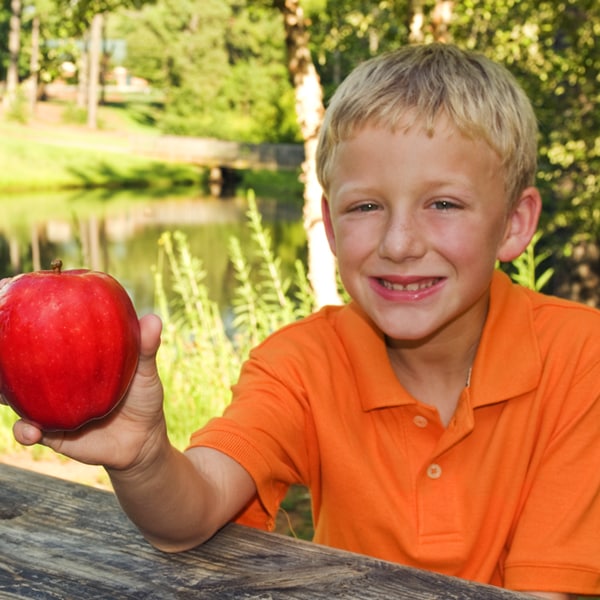By Dr Jennifer Barham-Floreani: Tip # 3: TOUGH LOVE
Many parents lament that they can’t get their children to eat certain foods or meals that they prepare…
Despite their best intentions, many parents today arrive at a stand-of with their children; the children dictate what they will and won’t eat, and then the parents become distressed when their kids fall ill with frequent colds and flus, ear infections and asthma, to name but a few repercussions of poor diet. Or in ever-growing cases, children acquire seemingly mysterious behavioral disorders with long labels that require medication. Even then, the link is often not made between diet and health.
Sometimes it seems a whole lot easier to just give into children and throw into their lunchboxes that vegemite, peanut butter or jam sandwich, a packet of chips, or a cupcake. There is no doubt that this type of approach to lunches is quick, simple, and easy. But the question is:
Is life simple and easy when we have hyperactive, angry or unwell children?
NO, it isn’t…full report
…Life is draining physically, emotionally and financially.
We cannot pour soft drinks or additives onto a potted plant and expect it to survive… the same applies to our body.
There is a direct relationship between what we eat and our quality of life and health. In Lunchbox Solutions, I discuss a variety of approaches to retraining fussy eaters.
Every family must negotiate guidelines and boundaries around many facets of lifestyle and behavior, but there are none as important as diet, because what your children eat has an ENORMOUS IMPACT on the whole family. It’s exhausting when they are chronically unwell when they are irritable and friends and family don’t want to spend time with them. So I’d encourage you to pick your battles and be clear that the “food battle” is one you want to win!
Even if your child appears quite healthy, remember that the impact of poor food choices may have a long-lasting effect on their health as adults. The cumulative damage of refined sugars and processed foods can be an enormous contributor to illnesses including diabetes and heart disease. It is our role as guardians to empower our family with proactive and positive habits.
Since my boys were very little they learned that they need to eat primarily wholesome foods and at times “sometimes foods.” It is vitally important that children learn how they can strengthen digestive power through eating foods that are as close to their natural state as possible including a wide variety of fresh organic vegetables and fruits, raw or organic nuts and seeds, beans, whole grains; you get the idea.
Foods Cont.
Foods should nourish and heal the body. Eating foods in their most natural state ensures we receive the highest nutritional content. Whole foods contain naturally occurring vitamins, minerals, enzymes, essential fatty acids, amino acids and more.
Consuming food shouldn’t be a toxic event. By eating “whole foods” we also help our family to reduce their intake of harmful chemicals. Such as preservatives, synthetic nutrients, and other additives that are considered non-foods (which are added to most all processed foods.)
If you can — try to eat organic foods whenever possible. This will help to ensure you avoid harmful toxins such as antibiotics, synthetic hormones, pesticides, herbicides, GMO’s, and synthetic fertilizers. Purchasing organic food is not a luxury but rather an integral step in securing our health. Pollutants in our modern environment—for example, pesticides, heavy metals, herbicides and fumigants—have been linked to abnormalities in behavior, perception, cognition, and motor ability during early childhood, even when exposure is at so-called harmless levels.
The goal is to teach the child to make these good decisions themselves
Where possible encourage children to help you shop and prepare meals and take the opportunity to highlight the pros and cons of different foods and false foods.
Encourage your children from a young age to also be open to having supplements or “vitamin boosts” from time to time. For example, smoothies and homemade juices are a great way to add multi-mineral powders and probiotics into their weekly diet. High-quality probiotics can provide the necessary bacteria for a healthy gut, and they are an essential aid to digestive health for all children — I would recommend taking these a few times a week. It’s also a great habit to encourage them to randomly have zinc and vitamin C powder drinks or multi-mineral drinks particularly if they have been really busy or had a few late nights.
Looking for a Kids Chiropractor in Auckland? We Can Help! 🙂
Contact Revolution Chiropractic – Leading Auckland Chiropractor
To Schedule your FREE CONSULTATION at Revolution Chiropractic E-mail or Call us on 09 418 3718.
You can also book online here !
Follow us on Instagram Or Twitter, connect with us on LinkedIn, become a fan on Facebook.
SUBSCRIBE TO OUR YOUTUBE CHANNEL FOR DAILY EXERCISE AND HEALTH ADVICE.
This blog is sponsored by Little Ninja & SPARTAFIT







